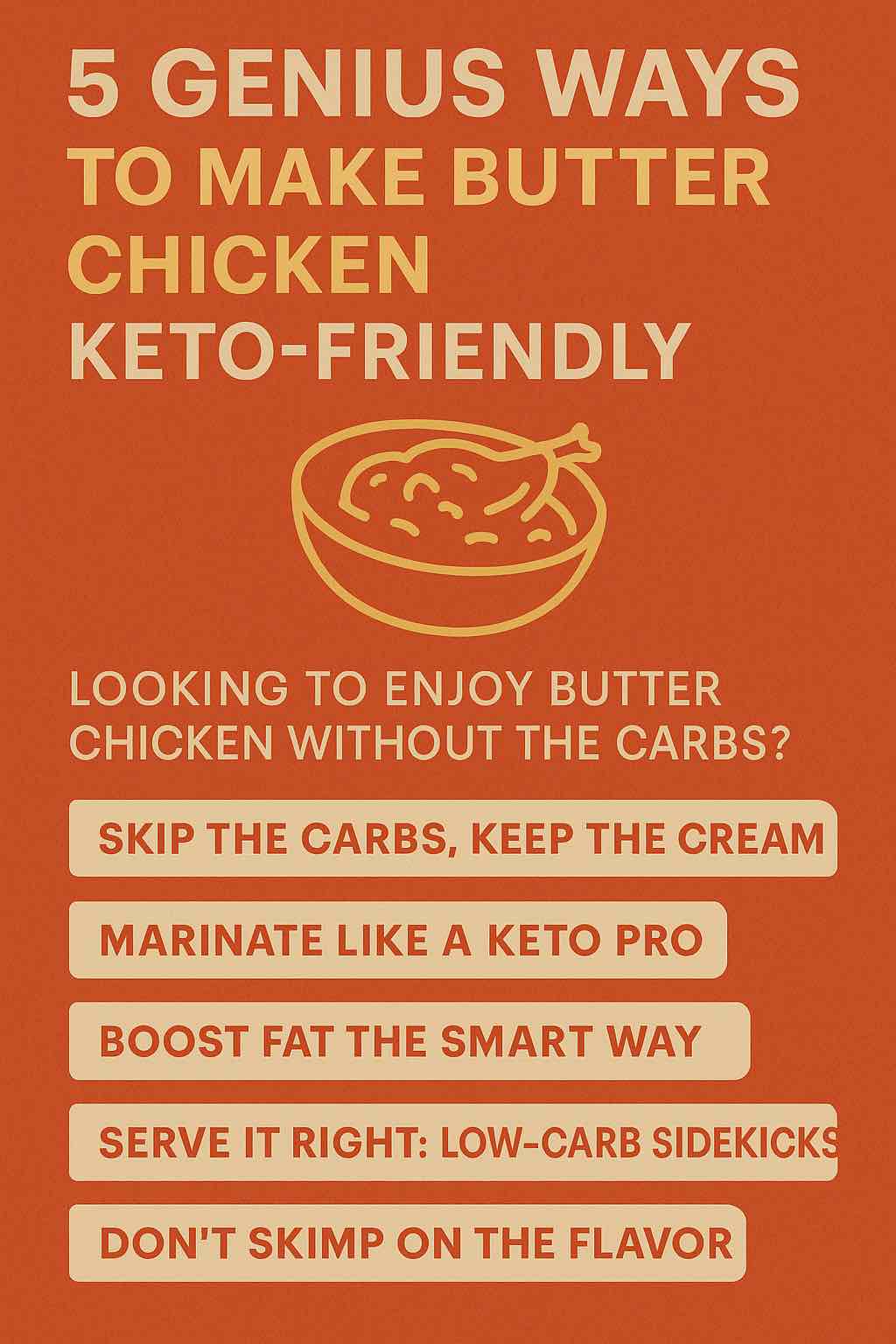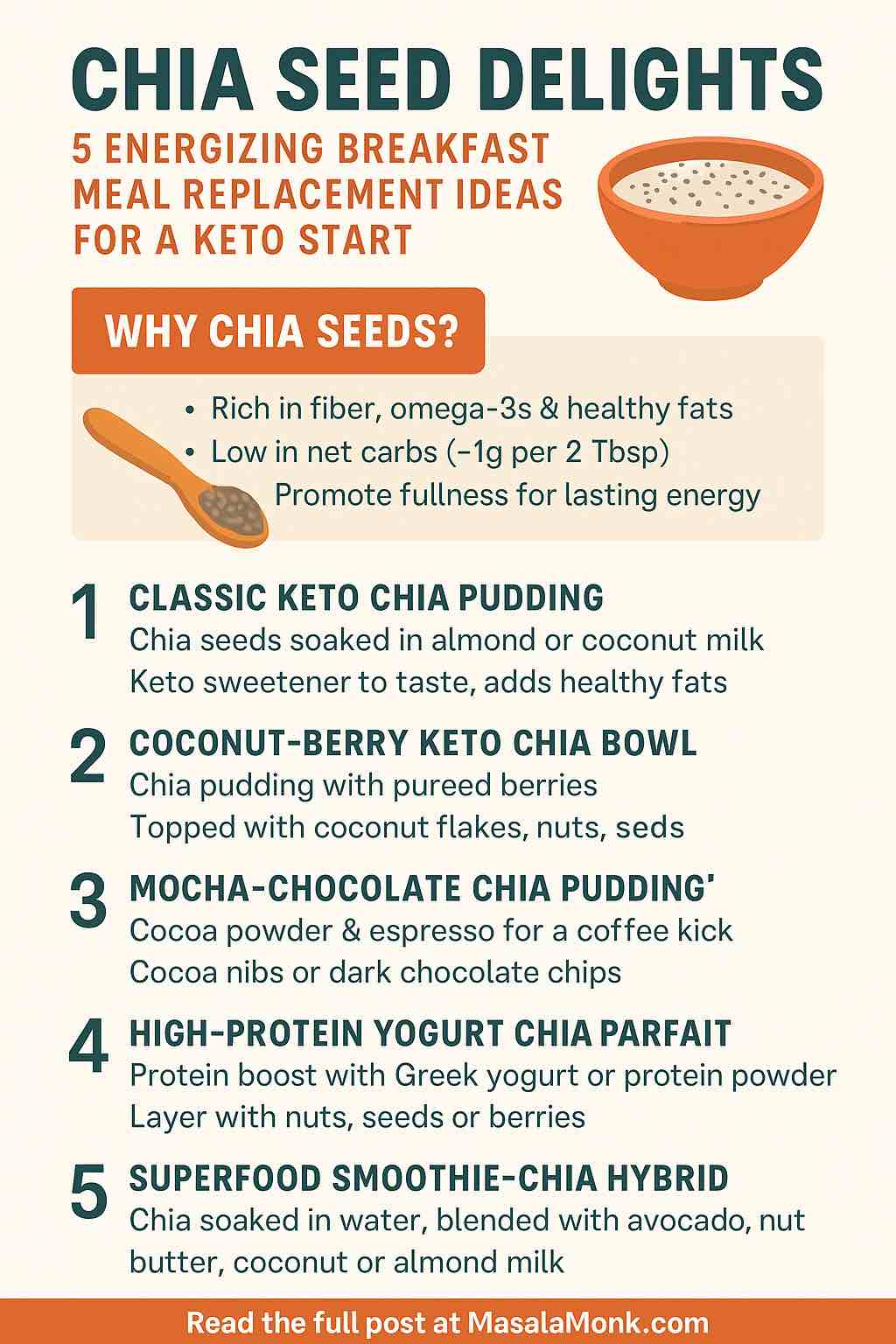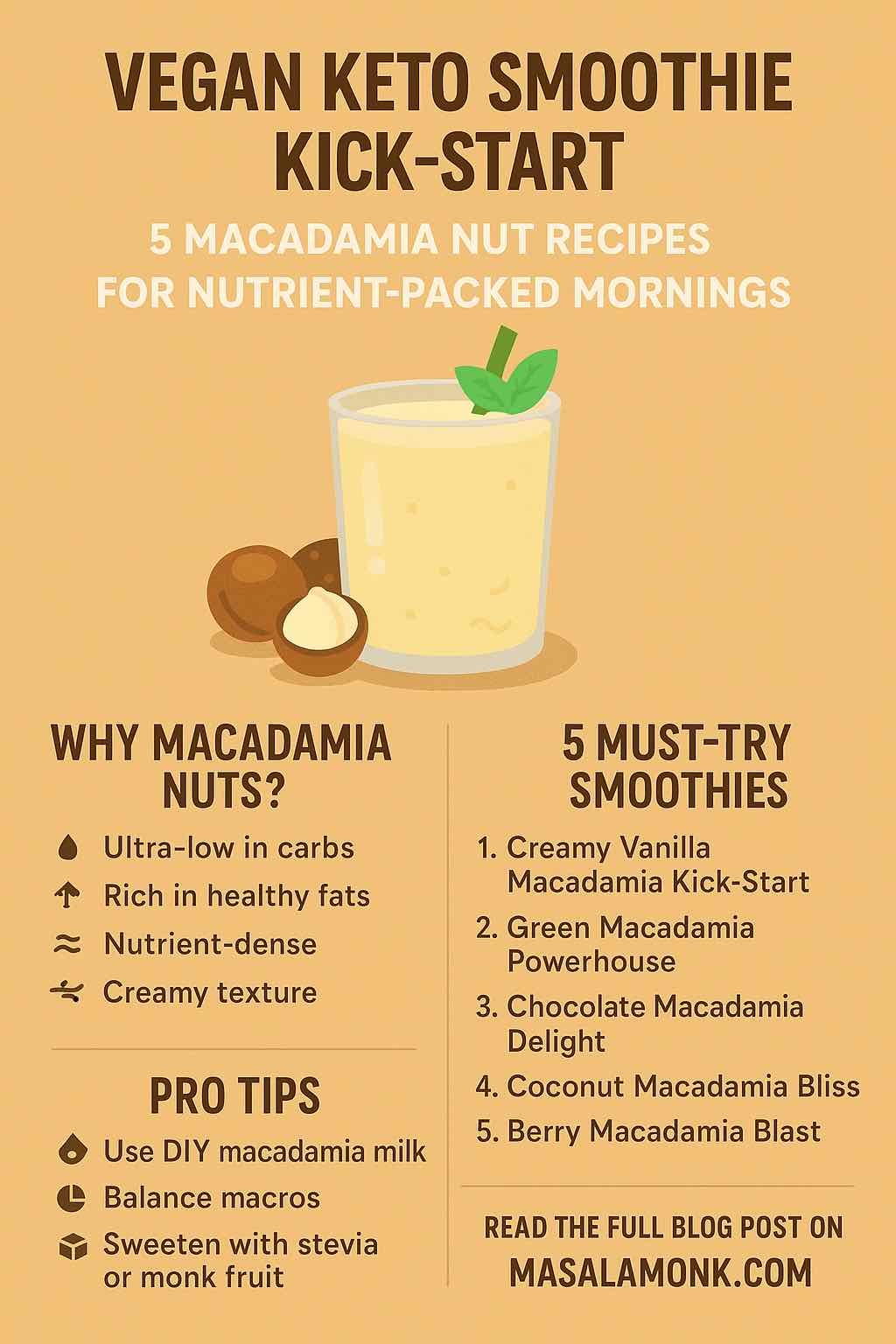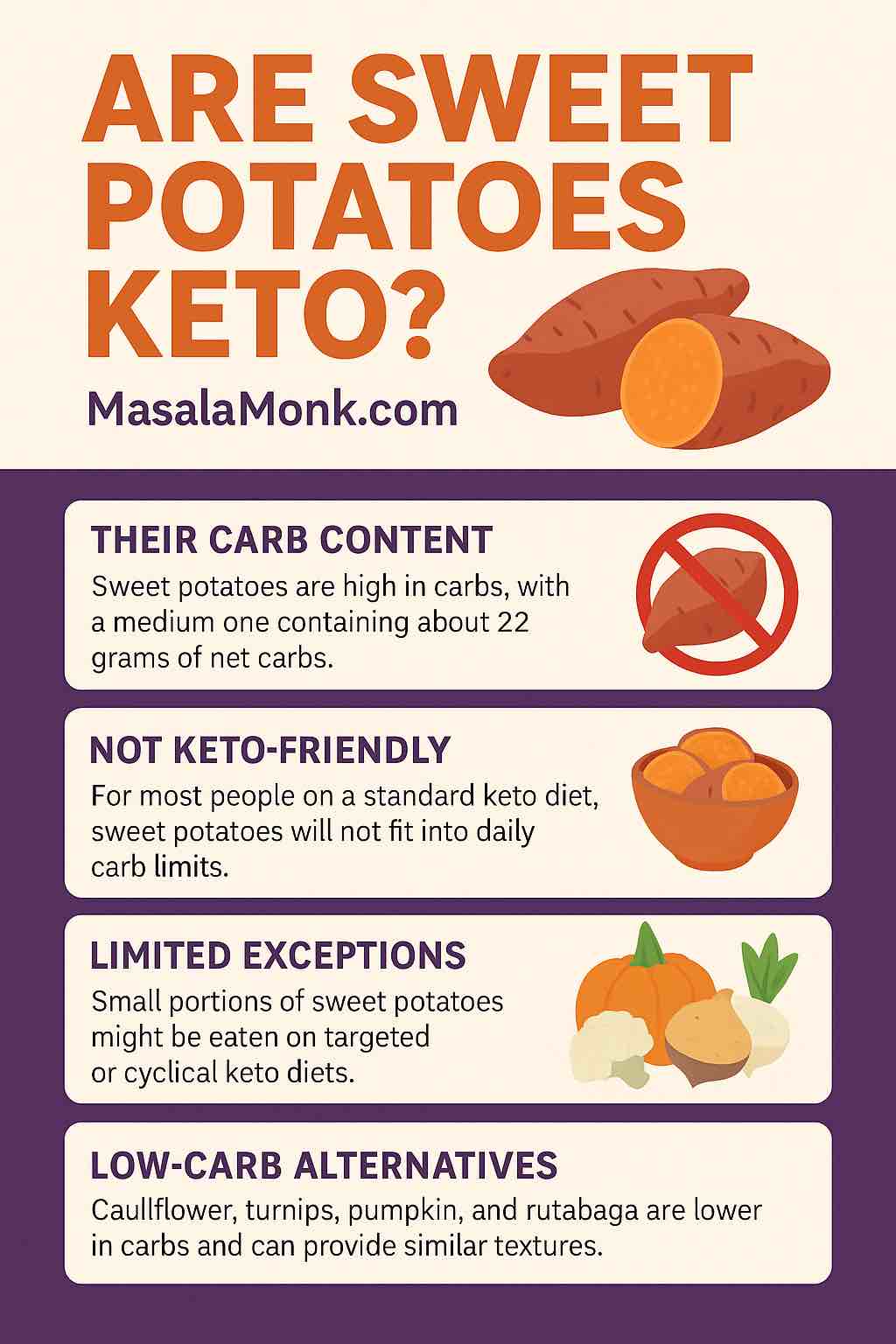
Indian Butter Chicken — velvety, spiced, and dripping with rich tomato-cream sauce — is a comfort food favorite around the globe. But if you’re on a keto or low-carb lifestyle, the traditional version often includes ingredients that knock you out of ketosis fast: sugar-laced sauces, thickeners like cornstarch, and sides like naan or rice.
Don’t worry — we’re not here to ruin the magic. We’re here to elevate it keto-style.
Here are 5 powerful (and practical) ways to transform Butter Chicken into a keto-friendly meal, complete with real tips, ingredient swaps, macros, and preparation strategies.
🔥 1. Skip the Carbs, Keep the Cream: Smart Sauce Tweaks
Traditional butter chicken sauce gets its luscious texture from tomato puree, butter, cream, and sometimes a starchy thickener like flour or cornstarch.
✅ Keto Fix:
- Use full-fat heavy cream (or coconut cream for dairy-free) — a keto staple.
- Go easy on the tomatoes: Use unsweetened tomato paste or just 1–2 fresh tomatoes to cut down the sugar.
- Avoid store-bought sauces which sneak in added sugars, cornstarch, or even wheat flour.
Pro Tip: A long simmer will reduce the sauce naturally, no need for starch.
Optional Thickeners:
- Almond flour or ground sunflower seed meal (½ tbsp).
- Xanthan gum (just a pinch — too much can get slimy).
🥣 2. Marinate Like a Keto Pro
A lot of flavor comes from marination — but many traditional Indian recipes call for sweetened yogurt, lemon juice (moderate carb), or even honey. You don’t need them.
✅ Keto-Friendly Marinade:
- Full-fat Greek yogurt (unsweetened) or coconut milk
- Spices: Garam masala, turmeric, chili powder, paprika, coriander, cumin
- Optional: Lemon zest instead of lemon juice (to minimize carbs)
Let it sit for 30 minutes to 4 hours — the longer the better.
🧈 3. Boost Fat the Smart Way
Keto isn’t just about cutting carbs — it’s about increasing healthy fats. Butter chicken is already halfway there with, well, butter.
✅ Add Healthy Fats:
- Grass-fed ghee or unsalted butter — don’t skimp.
- MCT oil (for experienced keto users) — drizzle at the end.
- Coconut cream instead of cream cheese for dairy-free options.
Layer flavors with fats: Start cooking with ghee, finish with butter, and stir in cream near the end for a rich, layered result.
🥥 4. Serve It Right: Low-Carb Sidekicks
Let’s face it — butter chicken is not complete without a vehicle for soaking up the sauce. But naan and basmati rice are high-carb traps.
✅ Keto-Friendly Sides:
- Cauliflower rice: Sauté with cumin seeds and a bit of ghee.
- Keto naan: Use almond flour, psyllium husk, and mozzarella cheese to make a pliable low-carb flatbread.
- Shirataki rice or noodles: Virtually zero carbs, slightly chewy texture.
Quick hack: You can also spoon butter chicken over steamed spinach or zoodles for a lighter take.
🌿 5. Don’t Skimp on the Flavor (Spices are Your Best Friend)
One common mistake in keto cooking is assuming that low-carb means low-flavor. Not true. Indian spices are zero-carb flavor bombs.
✅ Use Real Spices:
- Garam masala
- Cumin, coriander, turmeric
- Chili powder or cayenne for heat
- Kasuri methi (dried fenugreek leaves) — this is the magic herb that gives butter chicken its authentic depth.
Grind your own spice mix if you can — fresher = better.
🍴 Complete Recipe: Keto Butter Chicken (Serves 4)
🧾 Ingredients:
- 1.5 lbs boneless chicken thighs or breasts, cubed
- 3 tbsp full-fat Greek yogurt or coconut cream
- 1 tsp garam masala
- 1 tsp turmeric
- 1 tsp chili powder
- 1 tbsp ginger-garlic paste
- 3 tbsp butter or ghee
- 1/2 small onion, finely chopped (optional, adds 2–3g net carbs)
- 2 tbsp tomato paste (no added sugar)
- 1/2 cup heavy cream or coconut cream
- 1/4 cup water or chicken stock
- 1 tsp kasuri methi
- Salt to taste
- Fresh cilantro for garnish
- Optional: 1/8 tsp xanthan gum for thickening
🔪 Instructions:
- Marinate the chicken in yogurt, spices, and salt for 30 min or more.
- In a pan, melt 2 tbsp butter/ghee. Add onion (if using) and sauté until soft.
- Add chicken and brown lightly on all sides.
- Stir in tomato paste, water, and simmer for 10 minutes.
- Reduce heat. Add cream and the final tbsp of butter. Simmer until thickened.
- Stir in kasuri methi and optional xanthan gum.
- Garnish with cilantro and serve with cauliflower rice or keto naan.
🔍 Macros (Per Serving, Approximate)
| Nutrient | Amount |
|---|---|
| Calories | 460–550 kcal |
| Protein | 35–45 g |
| Fat | 35–45 g |
| Net Carbs | 5–6 g |
💡 Pro Meal Prep Tips
- Double the recipe and freeze half. The sauce freezes beautifully.
- Use rotisserie chicken for quick weeknight prep.
- Reheat with a splash of bone broth to keep the texture smooth and avoid clumping.
🧠 Final Thoughts
Keto Butter Chicken isn’t just a compromise — it’s arguably better than the original. Richer, more flavorful, and tailored for satiety and nourishment. With the right tweaks and smart swaps, you’ll get the full Indian restaurant experience… with none of the carb crash.
Whether you’re deep into keto or just experimenting with low-carb eating, this is one recipe to keep in your arsenal.
✅ 10 FAQs for Keto Butter Chicken
1. Is butter chicken naturally keto-friendly?
Not entirely. While it’s high in fat and protein, traditional butter chicken often includes sugar, high-carb tomato sauces, and is served with rice or naan — making it non-keto. However, with a few smart swaps, it can be made fully keto-friendly.
2. Can I eat tomatoes on a keto diet?
Yes, in moderation. Tomatoes have some natural sugar, so limit portions and opt for unsweetened tomato paste or fresh tomatoes. Avoid store-bought sauces with added sugar.
3. What’s the best thickener for keto butter chicken?
Use xanthan gum (just a pinch), almond flour, or natural reduction by simmering. Avoid flour or cornstarch as they’re high in carbs.
4. Can I use chicken breast instead of thighs?
Absolutely. Chicken breast is leaner, while thighs offer more fat (ideal for keto). Use either based on your macros and preference.
5. Is Greek yogurt keto-friendly for marination?
Yes, full-fat unsweetened Greek yogurt is suitable in small quantities and great for tenderizing chicken. Coconut cream is a dairy-free alternative.
6. How can I make it dairy-free and still keto?
Substitute ghee/butter with coconut oil, and heavy cream with full-fat coconut cream. The flavor changes slightly, but remains delicious and low-carb.
7. How many carbs are in keto butter chicken?
It ranges between 5–7g net carbs per serving, depending on ingredients like onions and tomato content. Using low-carb sides helps keep the total low.
8. What are good keto-friendly sides for butter chicken?
- Cauliflower rice
- Keto naan (almond flour & psyllium husk)
- Shirataki rice
- Zoodles
Avoid naan, paratha, or regular rice.
9. How long does keto butter chicken last in the fridge or freezer?
It lasts 4–5 days in the fridge and up to 2 months in the freezer. Reheat gently and add a splash of cream or broth to restore the sauce.
10. Can I use this recipe for meal prep?
Absolutely. Butter chicken gets better after a day as the flavors deepen. Make a big batch and pair it with pre-portioned keto sides for the week.












